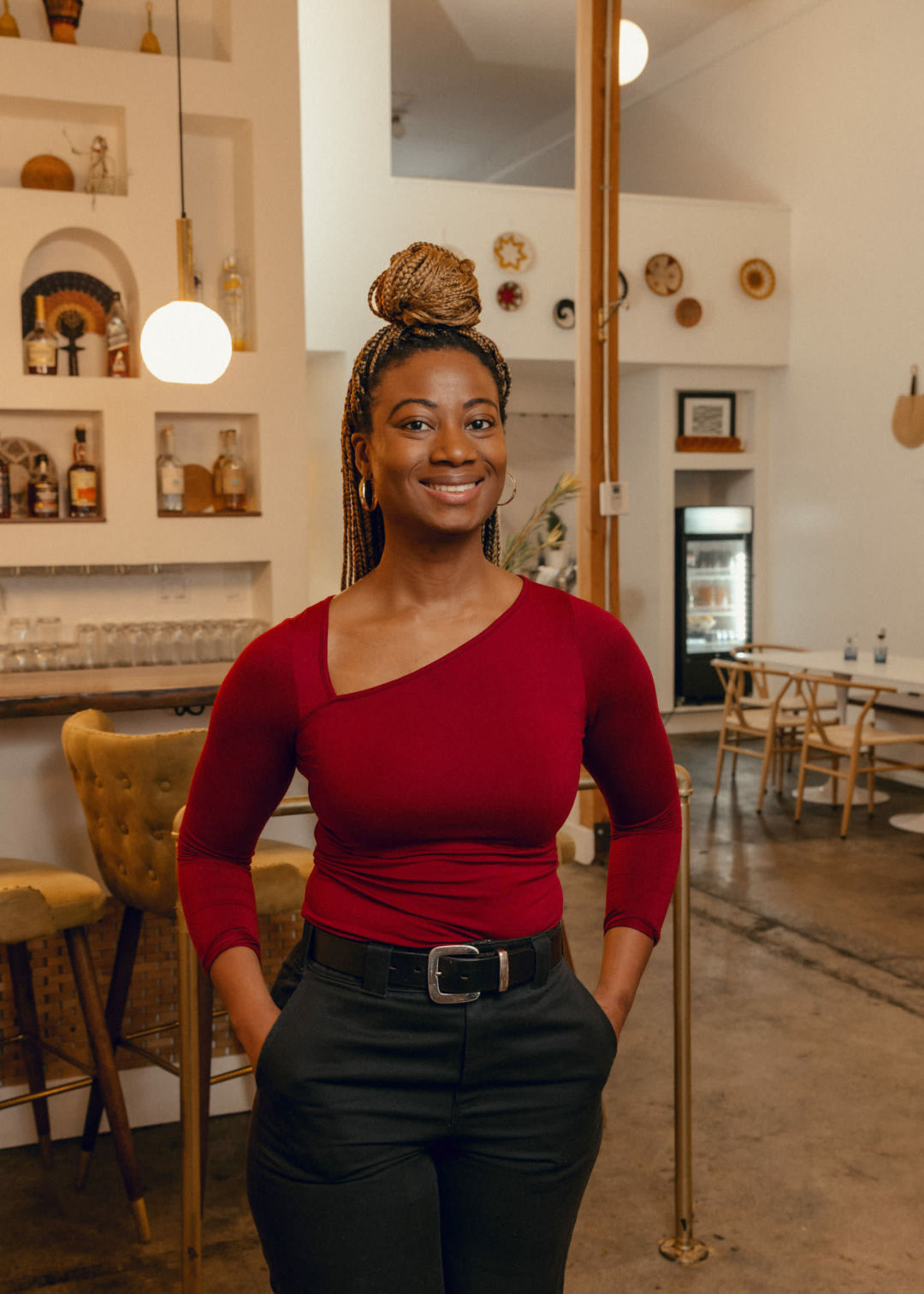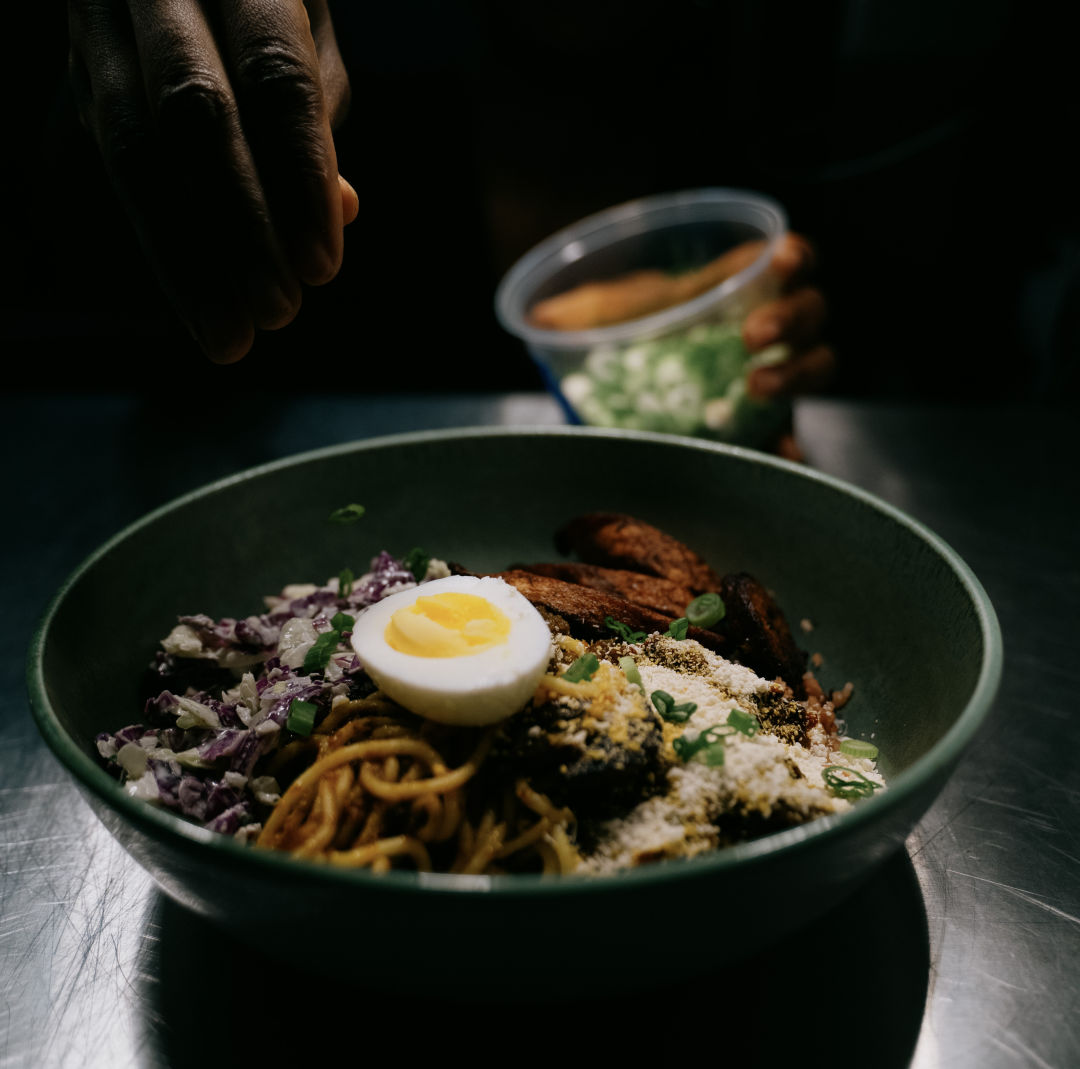Gold Coast Ghal's Tina Fahnbulleh on Popups and Potato Greens

Tina Fahnbulleh's Gold Coast Ghal Kitchen opened on Broadway in November.
Image: Jordan Nicholson
One of the most exciting new restaurants in the city opened quietly in November 2023. Tina Fahnbulleh took over the former Neon Taco space on Broadway and gave Seattle a much-needed—perhaps its only—restaurant serving traditional meals from Liberia and Ghana.
Today Gold Coast Ghal Kitchen keeps busy serving customers who are unfamiliar with dishes like waakye or Fahnbulleh’s favorite potato greens. But also visitors who nurture a connections to the food, or to Liberia specifically.
Here’s Fahnbulleh’s own account of how she went from a reluctant cook to a stand-in for so many African grandmas.
I was born in Liberia and grew up in Ghana until age 9. Then we moved as refugees to Philly. Then we lived in Saint Paul, Minnesota, which is where I finished high school and college. I actually earned a degree in screenwriting and production.
[As a kid,] cooking was one of my chores. It was not my favorite thing. Each Saturday I was responsible for cooking lunch for the entire house.
I came to Seattle in 2016. I just moved here for a change of scenery. I was an administrator for a number of years. I started cooking for friends. I was that person that would throw dinner parties. It was my way of getting acquainted with people.
When I moved out here, there was just Naija Buka at the South Lake Union farmers market. She was the only one I knew of that I could get [West African] food from. But she’s Nigerian so her food is similar, but different—you know? I wanted specifically Ghanaian Liberian food, so that’s what I started making.
I would tackle the more traditional style. Not the jollof rice, not the fried rice, suya. I would lean toward the more traditional-traditional Liberian stuff. So it was things like palava sauce, cassava leaves, the potato greens I have on my menu.
Then it became a side hustle; I was meal prepping for people who didn’t have time to cook. It became popups and catering. All while working full-time. I would try to have [popups] every other week or so and promote it by word of mouth, Instagram. It started with friends and the more popups I held, it became more strangers.
During Covid, I would put a menu on Instagram so folks could order and I’d deliver it to them. I was still working full time. I knew then that I loved what I was doing and I was willing to go all in.
About a year ago, a realtor reached out to me with my current space in mind. I said no; I wasn’t ready. When I was, I started looking at other properties. The current space still sat there; he convinced me to look at it.

The waakye, rice and black-eyed peas with spaghetti, is one of the restaurant's biggest hits thus far.
Image: Courtesy Gold Coast Ghal
Most people in general aren’t familiar with West African food, let alone cooking it. [The restaurant has] been steady, with growing pains and training the staff on the food—the pronunciation, the history of it. I want them to say, Oh, this is Tina’s favorite food, the potato greens. It’s really hard to source but it’s important to her that it’s here on the menu.
Usually when people hear potato leaves, they’re like, Oh, isn’t that poisonous? It’s a different species of potato leaves that are poisonous. But not the yam leaves. I actually had to go a week without the potato greens on the menu, just because what the farmers would bring, it wasn't of good quality. I couldn’t take it that week.
When I first opened, fufu wasn’t even on the menu. But it came highly requested. People come in and just want to order the fufu; we have to tell them, you want to have it with soup or stew. Otherwise it’s akin to just eating a taco shell.
I’m learning also about other African countries. One customer, where he’s from, they have their starches with stews, instead of with soups like us. At this time, [customers] are probably 25 percent African. I was talking to Janet at Pancita about this: everyone expecting the food to be the way their grandmothers cooked it.
That’s me as well, when I go to Hadiani or Bantaba, I want it to be a certain way, and when it’s not, the first few seconds—disappointment. But then I keep eating and I’m like, oh, this is actually really good.




